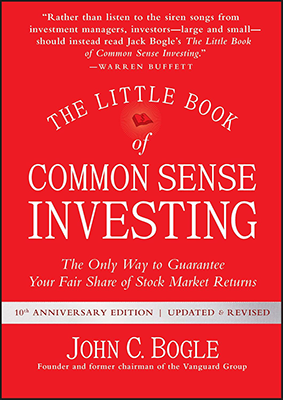
Little Book of Common Sense Investing
The Little Book of Common Sense Investing
“The Little Book of Common Sense Investing: The Only Way to Guarantee Your Fair Share of Stock Market Returns” by John C. Bogle advocates for a straightforward and effective approach to investing. Bogle, the founder of Vanguard Group and a pioneer of index fund investing, presents a case for why index funds are a superior investment strategy for most investors. Here’s a summary of the book’s key concepts:
The Case for Index Funds
– Efficient Markets: The stock market is efficient, meaning that it’s difficult for actively managed funds to consistently outperform the market. Index funds, which track a broad market index like the S&P 500, offer a simple and cost-effective way to invest.
– Market Returns: Index funds aim to match, rather than beat, market returns. This strategy is grounded in the idea that over the long term, it’s challenging to achieve higher returns than the market itself.
The Costs of Active Management
– High Fees: Actively managed funds typically have higher fees due to frequent trading and management costs. These fees can erode investor returns over time.
– Underperformance: Studies show that actively managed funds often underperform their benchmark indexes after accounting for fees and expenses.
The Importance of Low Costs
– Expense Ratios: Index funds generally have lower expense ratios compared to actively managed funds. Lower costs translate to higher net returns for investors.
– Compound Returns: Over the long term, the impact of lower fees can significantly enhance investment returns due to the power of compounding.
The Benefits of Diversification
– Broad Exposure: Index funds provide broad market exposure, which helps to diversify investments and reduce risk. By holding a wide range of securities, investors can mitigate the impact of poor performance by any single stock or sector.
– Reduced Risk: Diversification lowers the risk of significant losses and helps in achieving more stable returns.
The Long-Term Investment Approach
– Buy and Hold: Bogle advocates for a buy-and-hold strategy, where investors maintain their investments over the long term rather than trying to time the market.
– Patience and Discipline: Successful investing requires patience and discipline. Short-term market fluctuations are less important than long-term growth.
Investment Philosophy
– Simplicity: Embrace a simple and straightforward investment approach. Index investing is not only effective but also easy to understand and implement.
– Avoiding Speculation: Avoid speculative investments and focus on a strategy that aligns with your long-term financial goals and risk tolerance.
Investor Behavior
– Emotional Decisions: Investors should be aware of the impact of emotions on investment decisions. Reacting to market volatility can lead to poor investment choices.
– Stick to the Plan: Following a disciplined investment plan and avoiding market timing are key to achieving long-term success.
Key Takeaways:
– Index Funds are Optimal: Investing in low-cost index funds is one of the most effective ways to capture market returns and minimize costs.
– Costs Matter: High management fees associated with active funds can erode investment returns over time. Lower costs associated with index funds enhance overall returns.
– Diversification Reduces Risk: Broad market exposure through index funds helps reduce investment risk and provides stable returns.
– Long-Term Focus: A long-term investment approach, combined with a buy-and-hold strategy, is crucial for successful investing.
– Simplicity Over Complexity: A simple investment strategy, such as indexing, is often more effective and manageable than complex investment schemes.
Overall, “The Little Book of Common Sense Investing” advocates for a passive investment strategy through low-cost index funds, emphasizing the importance of reducing costs, diversifying investments, and maintaining a long-term perspective. Bogle’s principles are designed to help investors achieve their financial goals with minimal risk and effort.
